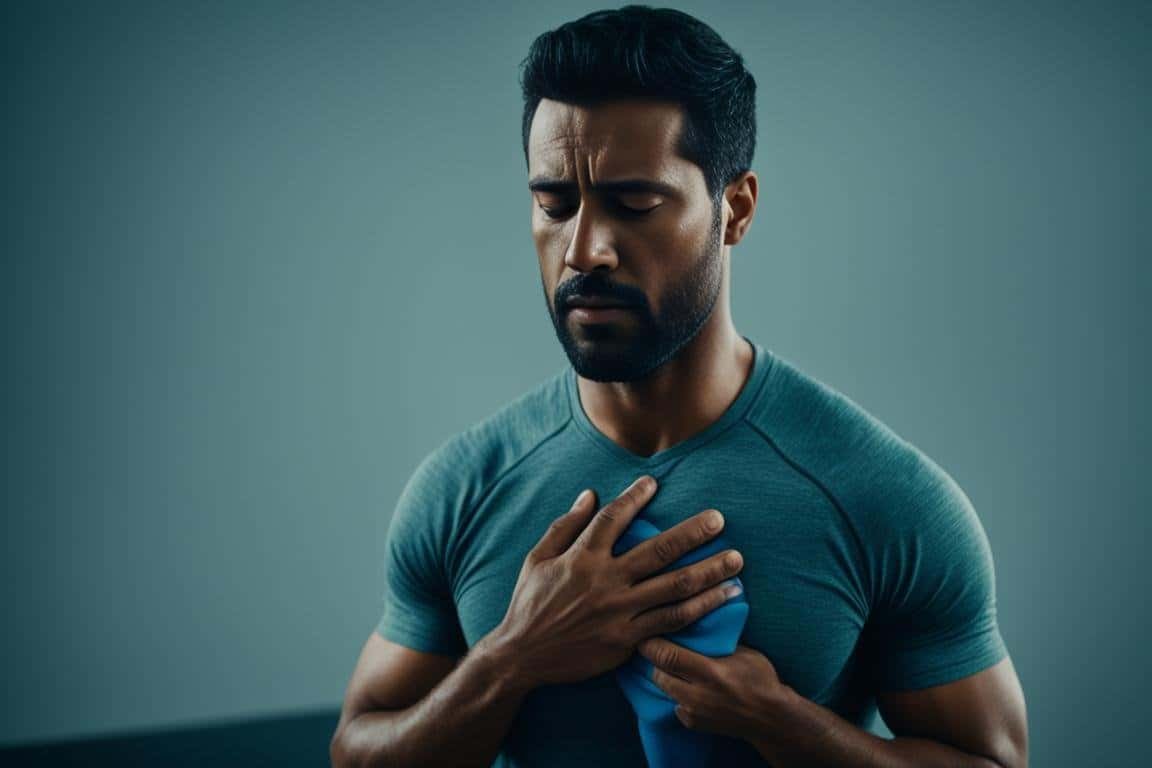Experiencing chest pain can be a cause for concern, but it’s important to understand that not all chest pain is the same. Chest discomfort can be attributed to both cardiac and muscular issues, such as a heart attack or muscle pain.
Cardiac chest pain occurs when there is a blockage in an artery, preventing oxygen-rich blood from reaching the heart’s muscle tissues. On the other hand, muscular chest pain is typically caused by muscle strain or overuse, often following physical exertion.
In order to differentiate between the two causes, it is essential to pay attention to the type and location of the pain, as well as the triggers and relief methods. By understanding the differences, you can better recognize the signs and seek appropriate medical attention.
Key Takeaways:
- Chest pain can be caused by either cardiac or muscular issues.
- Cardiac chest pain is often accompanied by shortness of breath, sweating, and palpitations, while muscular chest pain is usually localized.
- Seeking medical attention is crucial if you experience persistent or worsening chest pain, regardless of the cause.
- Understanding the differences in symptoms and triggers can help distinguish between a heart attack and muscle pain.
- A healthcare provider can help determine the cause of your chest pain and provide appropriate treatment.
Characteristics of Cardiac Chest Pain
Cardiac chest pain, also known as angina, is a common symptom of a heart attack. It is important to recognize the characteristics of cardiac chest pain in order to seek appropriate medical attention and treatment. Understanding the distinct features of cardiac chest pain can help differentiate it from other causes of chest discomfort.
Cardiac chest pain is often described as a sensation or tightness across the chest. It can manifest as a dull ache, aching, or squeezing feeling. The pain may also radiate to other areas of the body, such as the neck, jaw, arms, shoulders, throat, back, and upper abdominal region.
In addition to chest pain, cardiac symptoms may include shortness of breath, sweating, nausea, indigestion, and palpitations. These accompanying symptoms can provide further clues to the underlying cause of the chest pain.
Cardiac chest pain may be triggered by various factors, including exercise, stress, exposure to cold air, eating, or smoking. It typically lasts for a few minutes and is not relieved by massage or other external interventions.
Symptoms of Cardiac Chest Pain
| Chest Pain Characteristics | Accompanying Symptoms | Possible Triggers |
|---|---|---|
| Dull, aching, or squeezing sensation | Shortness of breath, sweating, nausea, indigestion, palpitations | Exercise, stress, cold air, eating, smoking |
Characteristics of Muscular Chest Pain
Muscular chest pain is often described as sharp, shooting, or achy. The affected area may also be tender to touch. Unlike cardiac chest pain, muscular chest pain is not typically associated with shortness of breath or other cardiac symptoms.
Commonly caused by muscle strain or overuse, especially after unusual exertion or activities not performed regularly, muscular chest pain can occur hours after exercise or the next day.
To find muscle pain relief, you can try various methods such as rest, Advil, Motrin, ice, heat, or massage. These approaches can help reduce inflammation and promote healing in the affected muscles, providing relief from muscular chest pain.

Differentiating Factors
Several factors can help differentiate between a heart attack and muscle pain. Understanding these distinctions can empower you to recognize and respond appropriately to your symptoms.
Symptoms
Cardiac chest pain, often associated with a heart attack, may be accompanied by additional symptoms such as shortness of breath, sweating, and palpitations. This pain can also radiate to other areas of the body, such as the neck, jaw, arms, shoulders, throat, back, and upper abdominal region.
Muscle pain, on the other hand, is usually localized and does not typically involve these additional symptoms. It is often described as sharp, shooting, or achy and may be tender to touch.
Pain Characteristics
The type and quality of the pain experienced can provide further clues to the underlying cause. Cardiac chest pain is commonly described as a sensation or tightness across the chest, which can be dull, aching, or squeezing.
Muscular chest pain, on the other hand, is often characterized by a sharp or shooting sensation. The pain may occur after physical exertion or activities that strain the muscles.
Triggers and Relief
Cardiac chest pain can be triggered by various factors, including exercise, stress, exposure to cold air, eating, or smoking. It typically lasts for a few minutes and is not alleviated by massage or other external methods.
In contrast, muscle pain is commonly caused by muscle strain or overuse and may occur hours after exercise or exertion. Rest, over-the-counter pain relievers, ice, heat, or gentle massage can help alleviate muscular chest pain.
Summary
By considering the presence of additional symptoms, the characteristics of pain, and the triggers and relief methods, you can differentiate between a heart attack and muscle pain. If you are experiencing persistent or worsening chest pain, it is essential to seek medical attention promptly to determine the cause and receive appropriate care.
Seeking Medical Attention
If you are experiencing persistent or worsening chest pain, it is crucial to seek medical attention, regardless of whether it is cardiac or muscular in nature. While cardiac chest pain requires immediate evaluation in an emergency room, other conditions that cause chest pain, such as muscle strain or inflammation, may also require prompt medical attention.
Consulting a healthcare provider is essential in determining the cause of the chest pain and receiving appropriate treatment. They will be able to assess your symptoms, perform necessary tests, and provide guidance based on their expertise. Remember, your healthcare provider is your trusted partner in safeguarding your well-being.
In the case of a heart attack, time is of the essence. Getting to the emergency room as soon as possible can make a significant difference in minimizing potential damage to the heart. Emergency room staff are trained to recognize and respond to heart attack symptoms promptly.
Regardless of the cause, seeking medical attention ensures that you receive the appropriate care and management for your chest pain. Your healthcare provider will guide you through the necessary steps, conduct follow-up assessments, and monitor your progress.

When to Seek Immediate Medical Attention
While it is essential to consult a healthcare provider for all chest pain cases, certain symptoms warrant immediate medical attention:
- Severe chest pain or discomfort
- Chest pain accompanied by shortness of breath
- Chest pain radiating to the jaw, neck, arms, shoulders, or back
- Fainting or loss of consciousness
- Signs of a heart attack, such as sweating, nausea, and palpitations
If you experience any of these symptoms, call emergency services or go directly to the nearest emergency room. Time is critical in such situations, and immediate medical intervention can save lives.
When to Seek Medical Attention for Chest Pain
| Symptoms | Possible Causes | Recommended Action |
|---|---|---|
| Severe, crushing chest pain | Heart attack, angina | Call emergency services or go to the nearest emergency room immediately |
| Chest pain with shortness of breath | Heart attack, pulmonary embolism | Call emergency services or go to the nearest emergency room immediately |
| Chest pain radiating to jaw, neck, arms, or back | Heart attack, heartburn | Call emergency services or go to the nearest emergency room immediately |
| Fainting or loss of consciousness | Heart attack, arrhythmia | Call emergency services or go to the nearest emergency room immediately |
| Prolonged or worsening chest pain | Heart attack, muscle strain | Contact your healthcare provider for further evaluation |
Other Causes of Chest Pain
In addition to heart attack and muscle pain, there are various other causes that can lead to chest pain. It’s important to consider these possibilities when evaluating your symptoms:
- Heartburn: Heartburn often presents as pressure or squeezing in the chest. This burning sensation is caused by stomach acid flowing back into the esophagus. It can be relieved with antacids or lifestyle modifications.
- Infections: Chest pain can be a symptom of respiratory infections, such as bronchitis or pneumonia. These infections can cause inflammation in the lungs and lead to discomfort in the chest area.
- Inflammation: Conditions like pericarditis, which is the inflammation of the lining around the heart, or pleurisy, inflammation of the thin tissues lining the lungs and chest wall, can cause chest pain.
- Panic Attacks: Panic attacks can cause intense chest pain, often accompanied by a rapid heartbeat, shortness of breath, and a sense of impending doom. These attacks can be triggered by stress or anxiety.
- Other Conditions: There are several other conditions that can manifest as chest pain, such as shingles, a viral infection that causes a painful rash, or muscle strain in the chest area due to overuse or injury.
It’s essential to consult a healthcare provider to determine the underlying cause of your chest pain. They can provide a proper diagnosis and recommend appropriate treatment options based on your specific condition.
Conclusion
Recognizing the difference between a heart attack and muscle pain is crucial for timely intervention and peace of mind. Chest pain should never be ignored, as it can be a symptom of serious underlying conditions. Understanding the characteristics, triggers, and relief methods associated with cardiac and muscular chest pain can help you distinguish between the two.
If you experience chest pain, it is always best to consult a healthcare provider to determine the cause and receive appropriate treatment. They can perform a thorough evaluation and order necessary tests to rule out any potential heart-related issues. Taking proactive steps to protect your heart health is essential for your overall well-being.
Remember, while muscle pain can often be relieved with rest, over-the-counter pain relievers, ice, heat, or massage, chest pain of cardiac origin may require immediate medical attention. Do not hesitate to seek medical help if you are experiencing persistent or worsening chest pain or if you are unsure about the cause. Your healthcare provider is the best person to guide you in recognizing the difference between heart attack symptoms and muscle pain, and how to proceed.

